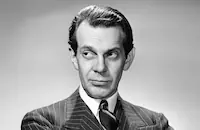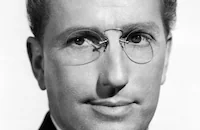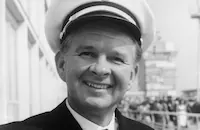The Great Impostor

Brief Synopsis
Cast & Crew
Robert Mulligan
Tony Curtis
Edmond O'brien
Arthur O'connell
Gary Merrill
Joan Blackman
Film Details
Technical Specs

Synopsis
On New England's Haven Island, Coast Guard agents arrest Ferdinand Waldo Demara, Jr. for impersonating numerous professionals, including his current alias, that of an elementary school teacher. Demara is handcuffed to his berth and escorted to the mainland, but all the while his concern resides mainly with the welfare of the students he has left behind. During the journey, Demara recalls the events that have brought him to his present predicament: As a child, Demara's grandiose ideas and bright curiosity are encouraged by his father, whose subsequent professional failures distress the young boy. Despite the sober counsel of local priest Father Devlin to "face facts" and settle for less, Demara continues to enjoy grandiose dreams. As a young adult, he quits high school in order to teach himself, not realizing that this will impede him when he joins the Army and attempts to become an officer. Prohibited from officers' training school, Demara then falsifies his credentials to match those of an accomplished stranger, Yale graduate Robert Lloyd Gilbert, and is immediately commissioned by the Marines. They inform him, however, that his papers will be sent to the FBI, and in order to avoid arrest, Demara fakes his own suicide and swindles his way into a Trappist monk monastery. There, Demara struggles with the ascetic rules of silence, piousness and, above all, lack of food. Although he strives resolutely, he is soon expelled. Outside the monastery, a farmer offers Demara a ride to town and his first taste of moonshine, which immediately lands him in jail. Soon discovered there by the FBI, he is sentenced to six years in a military disciplinary barracks, but Demara's charm and intelligence so impress Warden Ben W. Stone that he releases the young man after innocently providing him with detailed information about his own background. Demara then pretends to be Stone in order to gain work at a Texas prison, where Warden Chandler is enough impressed by his credentials and attitude to assign him to the maximum security cell block. There, Demara bravely eschews guard Lt. R. C. Brown's method of vicious control in favor of humane treatment, soon winning the respect and trust of the hardened inmates. He offers each man release from maximum security in return for a promise of contrition, but the men's brutal code of honor prevents them from accepting, which would be a tacit admission of weakness. While Demara's success grows, he also attracts the attention of Chandler's vivacious daughter Eulalie. One day, inmate Clifford Thompson attacks Brown with a knife. Demara restrains Brown from beating Cliff and instead challenges the inmate to a fair fight. Although Cliff is stronger than Demara, he allows the assistant warden to triumph, knowing that this way he will save face and Demara will treat him fairly. Soon after, Cliff is the first to break "the code" by asking to leave maximum security. Demara earns a promotion, but is then approached by a new inmate, Barney, who served with Demara in military prison and now threatens blackmail. With no other choice, Demara flees Texas and returns home, where he confesses his many personas to Father Devlin. Unable to convince Demara to turn himself in, Devlin prays for him to fall in love, an event that will force him to become honest. Undeterred, Demara joins the Royal Canadian Navy with the phony credentials of esteemed physician Dr. Joseph C. Mornay. By reading voraciously and following the previous doctor's orders, Demara manages to gain medical knowledge. One day, he spots nurse Catherine Lacey and falls in love at first sight. Although he tries to tell her the truth about his background, she refuses to listen, preferring the romance of the unknown. His love for Catherine, as Devlin has predicted, spurs Demara to want to clear his name, and to this end, he transfers to Korea and promises Catherine that once he "wipes away his guilt," he will return for her. Demara boards a Naval ship where the captain needs an emergency dental procedure, and although he administers an excess of anesthetic, the captain enjoys his long sleep and considers Demara a professional. When a recently attacked Korean ship approaches, bearing dozens of men in critical condition, Demara works day and night to treat them all, performing several miraculous operations. Months later, Demara has opened a hospital in Chinnampo and is earning worldwide press as "The Miracle Doctor." Unfortunately, the real Dr. Mornay soon sees Demara's photo in the newspaper and exposes him as a fraud. The news about "The Great Impostor" spreads throughout the world, reaching each of his old contacts and lovers, including Catherine. As Demara faces a Canadian board of inquiry to determine if he should be court-martialed, his lawyer informs him that each of his former employers has volunteered to speak in his behalf. Demara is pleased until he hears that Catherine is coming to visit and, ashamed, insists on addressing the board. There, he convinces them to spare themselves further embarrassment by allowing him to leave the country quietly. He awakens in the present, on the Coast Guard boat, unaware that Devlin and Catherine await him on shore with the news that she still wants to marry him and the Haven Island board of education insists that he return to them. By the time the boat docks, Demara has escaped out the port hole. Years later, the FBI hopes that their new expert agent, Sgt. Wilkerson, will crack the current search for Demara. What they fail to realize is that Wilkerson is, in fact, Demara in yet another disguise.

Director

Robert Mulligan
Cast

Tony Curtis

Edmond O'brien

Arthur O'connell

Gary Merrill

Joan Blackman

Raymond Massey

Robert Middleton
Jeanette Nolan

Sue Ane Langdon

Larry Gates
Mike Kellin
Frank Gorshin
Cindi Wood
Richard Sargent
Robert Crawford
Doodles Weaver
Ward Ramsey
David White
Philip Ahn
Herbert Rudley

Jerry Paris

Harry Carey Jr.
Willard Sage

Karl Malden
Dan Sheridan
Harry Townes

Gage Clarke

Richard Gaines
Frank Maxwell
Wendell Holmes

Russ Conway
Robert Hastings
Henry Hunter
Oliver Mcgowan
Bing Russell

Nicky Blair
Don Ross
Hugh Lawrence
John Cliff
Charles Cantor
Charles Cane
John Morley

John Zaremba
Karl Lukas
Jarl Victor
Robert Anderson
David Mcmahon
Paul Sorensen
Tim Graham
Barbara Wooddell
Maggie Brooks
Alphonse Martell
Nancy Root
John Mccomb
Harry Harvey Jr.
William H. Mclean
Ted Markland
James H. Drake
William Hudson
Don Wilbanks
Jane Chang

James Dobson
Scott Elliott
George Taylor
Herbert Lytton
Robert Dornan
Ted Knight
Dale Ishimoto
Robert Kino
Ted Jacques
Roy Taguchi
Colleen O'sullivan
Lincoln Demyan
Helen Boll
Doug Marland
Roger Dollarhide
Noanna Dix
John Slosser
Elizabeth Flourney
Bob Herron
Tom Steele
Frank Sentry
Tipp Mcclure
Michael Ford
Bob January
Jerry Hall
George Drake
Pat Curtis
Bernard Krakower
Michael Emmet
Warren Vanders
Wilson Cornell
Robert Barrow
George Lake
Crew
Robert Arthur
Don Bolger
Henry Bumstead
Robert Burks
Tom Case
Jack Danskin
Edward Dodds
Robert Forrest
Larry Germain
Joseph Gershenson
Alexander Golitzen
Julia Heron
Joseph Kenny
Frederic Knudtson
Eugene Liggett
Robert Luthardt
Henry Mancini
Norman Mayries
Herbert Mendelson
Edward Muhl
Liam O'brien
Marie Osborne
Commodore James Plomer Rcn
Lynn Reynolds
Blackie Rosekrantz
Peter Saldutti
Charles Scott Jr.
Lennie South
James Swartz
Waldon O. Watson
Bud Westmore
Frank Wilkinson

Film Details
Technical Specs

Articles
Frank Gorshin (1933-2005)
He was born on April 5, 1933, in Pittsburgh, Pennsylvania into a family of modest means, his father was a railroad worker and mother a homemaker. His childhood impressions of Edward G. Robinson and James Cagney paid off when he won a local talent contest at 17, and that led to his first gig at 17 at a the prize was a one week engagement at Jackie Heller's Carousel night club, Pittsburgh's hottest downtown spot in the day. The taste was there, and after high school Frank enrolled in the Carnegie-Mellon Tech School of Drama did hone his craft.
His career was interrupted briefly when he entered the US Army in 1953. He spent two years in Special Services as an entertainer. Once he got out, Frank tried his luck in Hollywood. He made his film debut in a forgettable William Holden vehicle The Proud and Profane, but his fortunes picked up soon when he and when he hooked up with American Internation Pictures (AIP). With his charasmatic sneer and cocky bravado that belied his slender, 5' 7" frame, Frank made a great punk villian in a series of entertaining "drive-in" fare: Hot Rod Girl (1956), Dragstrip Girl, Invasion of the Saucer Men, and of course the classic Portland Expose (all 1957).
By the '60s, he graduated to supporting roles in bigger Hollywood fare: Where the Boys Are, Bells Are Ringing (both 1960), Ring of Fire, and his biggest tole to date, that of Iggy the bank robber in Disney's hugely popular That Darn Cat (1965). Better still, Frank found some parts on television: Naked City, Combat!, The Untouchables, and this would be the medium where he found his greatest success. Little did he realize that when his skeletal physique donned those green nylon tights and cackled his high pitch laugh that Frank Gorshin would be forever identified as "the Riddler," one of Batman's main nemisis. For two years (1966-68), he was a semi-regular on the show and it brought him deserved national attention.
By the '70s, Frank made his Broadway debut, as the star of Jimmy, a musical based on the life of former New York City Mayor Jimmy Walker. He spent the next two decades alternating between the stage, where he appeared regularly in national touring productions of such popular shows as: Promises, Promises, Prisoner of Second Street, and Guys and Dolls; and nightclub work in Los Angeles and Las Vegas.
He recently found himself in demand for character roles on televison: Murder, She Wrote, Lois & Clark: The New Adventures of Superman and film: Terry Gilliam's Twelve Monkeys (1995), and the quirky comedy Man of the Century (1999). Yet his biggest triumph was his two year stint (2002-2004) as George Burns in the Broadway smash, Say Goodnight Gracie. It ran for 364 performances and he received critical raves from even the toughest New York theater critics, proving undoubtly that he was a performer for all mediums. He is survived by his wife Christina; a son, Mitchell; grandson Brandon and sister Dottie.
by Michael T. Toole

Frank Gorshin (1933-2005)
Quotes
Trivia
Notes
The opening credits include the following written statement: "This story is based on the book by Robert Crichton relating the facts of the many amazing careers of Ferdinand Waldo Demara, Jr.-who is still very much alive and continuing to prove that `truth is stranger than fiction.'" The film begins with Tony Curtis, as Demara, watching as one of his elementary school students writes the Abraham Lincoln quote, "You can fool some of the people all of the time, all of the people some of the time, but you cannot fool all of the people all of the time." After the children leave, Demara wipes out the "not" in "cannot." The closing credit title reads "The End," over an image of Curtis shaking his head in contradiction. An acknowledgment in the closing credits reads, "`We wish to thank the Royal Canadian Navy and the United States Coast Guard for their assistance in the production of this motion picture.' ¿Technical advisor, Commodore James Plomer, RCN."
As depicted in the film, Demara (1921-1982) assumed many identities during his lifetime, utilizing his sharp intellect and memory to gain infamy as an impostor. He attended Catholic high school, but did not graduate, instead entering a Trappist monastery before joining the Navy in 1941. His many exploits included adopting the identity of Dr. Joseph Cyr and serving in the Canadian Navy as a surgeon. After being discovered and dismissed from service, he went on to impersonate a zoologist, law student, cancer researcher and many others. He was the subject of Robert Crichton's popular biography The Great Impostor, but considered the book inaccurate.
In March 1959, Los Angeles Times reported that Universal had bought Crichton's book and assigned it to producer George Englund, with Stewart Stern set to write the screenplay. The next month, Daily Variety stated that Robert Arthur would produce, with Alec Coppel to write the screenplay. On December 18, 1959, Daily Variety noted that director Robert Mulligan had begun preparations for filming, but a writer's strike postponed the start date until April 1960. During this time, a February 1960 Hollywood Reporter news item reported, the studio allowed Mulligan a leave of absence to work on a television project. On May 24, 1960, Hollywood Reporter noted that a tidal wave had hit Los Angeles Harbor, "seriously disrupting" the shooting schedule.
Mulligan stated in a May 12, 1960 Los Angeles Times article that he approached many seasoned actors to take "vignette roles" in The Great Impostor, but all refused until Karl Malden agreed to play the small role of "Father Devlin." On May 18, 1960, Hollywood Reporter mistakenly reported that Harry Carey, Jr., who portrayed "Dr. Joseph C. Mornay," was to play a prison warden. As noted in a September 4, 1959 Daily Variety article, at the same time that The Great Impostor was being produced, the real Fred Demara was portraying a physician in the 1960 Allied Artists film The Hypnotic Eye (see below). According to June 26, 1960 Los Angeles Examiner article, some scenes were shot on location in Los Angeles' Griffith Park. The picture marked the feature film debuts of Robert Crawford and Sue Ane Langdon. As stated in a January 26, 1961 Hollywood Reporter news item, Henry Mancini recorded the film's instrumental title song and a love theme called "Love Music" for RCA Victor. Although similar in theme to the 2002, Steven Spielberg-directed film Catch Me If You Can, the two films are otherwise unrelated and based on different real-life personalities.

Miscellaneous Notes
Released in United States Winter December 18, 1960
Released in United States Winter December 18, 1960













